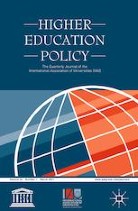Announcing publications has been a steady stream of hurrahs! since I’ve been with the Institute for Higher Education Research. That’s because the research dynamic is quite different from what I’ve known from American Studies. As my list of publications attests, it’s a lot of reports and grey literature. Thus, it gives me great pleasure to announce that for the first time, I’ve published a paper in my (not so) new (anymore) field of research — science studies and higher education research — in a peer-reviewed article. And, as most of the peer-reviewed stuff in the field is in English, it’s no surprise that the article was published in English.
It’s got a rather long title, my co-authors and I hoped would be funny, and its research question is: Why do academics, mostly professors, who already have have little time to spare, join advisory boards? Or, in other words: What motivates them to take on the extra burden?
I really enjoyed writing this article (together with my usual collaborators, although this time the bulk of the work was done by me) and I also very much appreciated the peer-review process. The comments were extremely helpful, mostly pointing out that we have to streamline our argumentation and cut a lot of fat on the article. As we compiled the text from a much broader research report in German and elaborated on passages where academic motivations were discussed, the original article was indeed uneven, trying to be too much in too many aspects.
Handed in initially at the end of 2023, and with two rounds of peer commentary (the first one pointing out major shortcomings, the second one mostly asking for improvements of graphs and the literature list), the article was finally published in August 2024. And, as the Institute’s university is part of the DEAL consortium and the journal forms part of Springer publishing, the article was published online and open access right away, with the option of eventually being included in the printed version of the journal.
Which means that the article can be read here.
And which also means that I’ve get all kinds of metrics about the article — most of which makes me sad: At the time of writing, the text has 139 “accesses,” which means unique views on the website and downloads. And zero citations so far.
On the other hand, the DEAL-deal made it possible that this article (and all these interaction metrics and whatnot) form part of the treasure trove of Springer Nature’s content, which allowed Springer to offer shares on the stock market. And in only a few days after the IPO, Springer’s share prices have already seen a hike of almost 10%. I presume I should be very happy because this definitively means that my work has contributed to the good fortunes of a multinational stock-marked listed company and thus the generation of wealth in general. And I guess that’s what academic work is good for. Thanks Springer, it’s been an (academic) honour!

